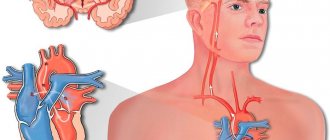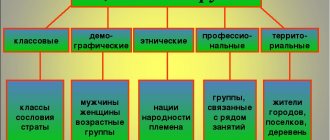Each person has certain characteristics that are expressed in emotional manifestations, selection of specific actions and reactions. All this happens automatically and is defined by people as character traits. There are many personality types to quickly determine what kind of person you are communicating with.
Everyone knows what character is. This is a set of qualities that are inherent in a particular person. Character is developed throughout life. As a child, he is flexible and quickly changing. Over the years it becomes more stable and eventually consolidates. Each reader of the online magazine psytheater.com has his own character. The article will tell you what it is and what features this phenomenon has.
What is personality character?
Every person encounters the character of another person. What it is? This is a characteristic of the psyche that combines permanent and stable qualities that determine the behavior and attitude of an individual. Translated from Greek, character means “trait”, “sign”. This is a stable characteristic that affects behavior, ways of reacting, activities and individual manifestations of a person.
We can say that the character of a person determines a person’s entire life, his destiny. They say that fate is predetermined. In fact, a person who does not obey specific rules and strategies creates his own destiny, which he then lives.
By changing your character, you can change your destiny, since character determines the reaction, behavior, and decisions a person makes in a specific situation. If you look closely, you can see that people who are similar in character live the same life. Only the details differ, but their ways of thinking and behaving are the same.
Character is formed throughout a person's life. It can be changed at any moment, which in adulthood is possible only under the influence of one’s own desire and willpower. If a person cannot change his character, then his life does not change and its development is predictable.
Character Formation
A person’s character develops in a specific period of life under the influence of certain factors. Which ones?
Time frame
Character formation is a time-limited process that spans childhood and adolescence—up to 20–25 years. Later we will talk about re-education, which is given with great difficulty. By the age of 4–5 years, the “skeleton of personality” is already ready - the child’s behavior towards himself, towards people, towards work and surrounding objects has been determined in general terms. Educators can see the peculiarities of the manifestation of his mental qualities: mental abilities, emotional-volitional sphere, moral attitudes.
Personality Traits
A personality trait is understood as a constant and stable pattern of behavior. They are divided into:
- Leading traits that determine the manifestation of personality.
- Secondary ones, which are subordinate to the leading ones or are not always manifested, are less pronounced.
It is the leading character traits that determine a person’s activity and attitude towards assessing the world around him. However, not every attitude that a person displays speaks volumes about his character. Conditions and willpower should be taken into account when a person decides what reaction to show.
Personality structure is divided into 4 groups:
- Determining the basis of a person: cowardice and integrity, cowardice and courage, insincerity and honesty, etc.
- Showing an individual’s attitude towards others: kindness or anger, contempt or respect, etc.
- Determining attitude towards oneself: vanity, pride, self-criticism, modesty, etc.
- Manifested in relation to work, labor: laziness and hard work, passivity and activity, irresponsibility and responsibility, etc.
There is another group of character qualities that determine the attitude towards things, for example, sloppiness or neatness.
Character traits are also divided into normal and abnormal. Normal traits include the qualities of a healthy personality. Anomalous are manifestations resulting from mental disorders. However, abnormal qualities should be distinguished from those that are normal, and vice versa. For example, healthy suspicion is normal. If it manifests itself excessively, then it becomes abnormal - paranoia.
Character changes depending on the type of activity, society, social circle, attitude towards oneself and the world as a whole. If any of these aspects change, this may affect the change in the quality of character. If everything in a person’s life remains unchanged, then character traits remain unchanged.
Character anomalies
Character anomalies are said to exist if a person’s actions make communication difficult and impossible. Psychotherapists identify several types of behavioral abnormalities.
Excitable psychopaths suffer from a lack of inhibition of nervous processes. Any little thing makes them angry; in a state of passion, they threaten their interlocutor and try to get hurt. They are not capable of long-term work, because they are torn apart by “internal irritation.”
The asthenic type of anomaly is a rapid depletion of mental reactions. Such people are shy, have a hard time withstanding troubles, and at the slightest cough/runny nose they fear for their health and become helpless.
Paranoid type - nervous processes are inhibited, stagnant foci of excitation are formed. Such people are touchy and suspicious - and are always fixated on themselves. They remember negative situations towards themselves for a long time and demand restoration of justice.
Personality traits
The character of a person is also formed under the influence of the values and moral beliefs that a person uses. The more stable they are, the more a person becomes entrenched in his behavior and manifestations. The main feature of personal character is its certainty, where one can note the leading features, of which several always stand out. Definition of character disappears if there are no stable qualities.
Character is also based on the interests that a person has. The more stable and constant they are, the more a person becomes focused, persistent and integral in his manifestations.
You can determine the character traits of another person by his actions and their direction. Both actions and the results that he achieves after completing them are important. They are the ones who show a person's character.
Adaptation of character to society
Any culture, people and civilizations have certain frameworks of behavior. A person cannot exist outside of society. From childhood, a child has to adapt to the requirements of the environment - family, kindergarten, school. An adult is influenced by many social forces, from spouses to politics, religion, social class. A person’s character inevitably adapts to the demands of society. At the same time, many natural inclinations of the individual are put under pressure.
History knows many examples when brilliantly gifted people came into conflict with their environment due to the inability to lead the lifestyle that their nature required. At the same time, social norms allow a person to lead a safe life in the society around him. Such social character traits as loyalty, tolerance, and politeness allow painless contact with others. Rejection of social norms, primarily laws and morals, creates an asocial personality.
In modern psychology there is a term “national character traits”. Each nation develops certain common, typical behavior patterns among its representatives. For example:
- The peoples of Northern Europe and Americans are self-confident, honest, practical, persistent, and freedom-loving. The conservatism and subtle humor of the British, the punctuality of the Germans, and the taciturnity of the Scandinavians are well known.
- Residents of Southern Europe and Latin America are energetic, temperamental, emotional, cheerful, and sensual. A romantic Italian, a passionate Spanish woman, a charming French woman, restless Brazilians - there is a lot of reality in these stereotypes;
- Representatives of Eastern Europe (Russians, Ukrainians, Belarusians, Poles, Czechs) love constancy, are magnanimous, generous, selfless, sympathetic, prone to repentance and forgiveness. The widespread stereotype of the “mysterious Russian soul” has many foundations.
- The peoples of the East are much more respectful of their parents and, in general, elders than Europeans. Eastern societies, much more than European ones, are characterized by hospitality, family honor, dignity, modesty, goodwill, and tolerance.
Traits of a social nature are inextricably linked with religious norms. The standards of Christian morality include the following qualities:
- Lack of envy;
- Chastity;
- Meekness;
- Generosity;
- Sociability;
- Compassion.
The influence of religious culture in the history of society is very strong. Even modern atheists in European countries consider the main Christian value - love for people - to be the best personal characteristic.
Islamic society creates the following traits in people:
- Respect for elders;
- Hospitality;
- Modesty;
- Courage;
- Humility.
Temperament and personality
The relationship between temperament and personality is visible. Although these characteristics are determined by the human psyche, they are different quantities. Temperament is determined by the structure of the nervous system, which makes it an innate quality, the manifestations of which cannot be changed, but you can simply do something.
Character is a flexible aspect that is formed throughout life. A person can change it, which is determined by his life activity.
Character is formed based on the temperament with which a person is born. Temperament can be called the basis on which the entire branch of his character qualities is built. At the same time, temperament does not change depending on external circumstances and type of activity.
Temperament is characterized by three directions, each of which has its own complex structure:
- Mobility (activity). It manifests itself in vigorous activity, self-expression, manifestation of oneself, which can be either sluggish or overly active.
- Emotionality. There is a variety of moods and feelings here. Defined by:
- Lability – the speed of change from one mood to another.
- Impressiveness - the depth of perception of external emotional stimuli.
- Impulsivity is the speed at which an emotion transforms into a motivating force for action without thinking it through and making a decision to carry it out.
- Motor skills.
Types of social characters according to E. Fromm. Unfruitful Orientations
Unfruitful orientation includes such orientations as:
- receptive;
- exploitative;
- acquisitive;
- market
Receptive orientation
A person belonging to this type represents the source of all goods, which lies outside. In his opinion, the only way you can get what you want is to get it from an external source.
Based on this, the problem of love is that a person wants to be loved without loving himself. This type chooses the same strategy in the field of intelligence: he is ready to perceive ideas, but not create them. The first thought of a type with a receptive orientation is to find someone who will provide him with the necessary information, instead of searching for it himself.
If people are religious, then they expect everything from God without showing their own activity. They need people who can provide them with security and give them the necessary benefits. Because of this, they become dependent on others. When such people are left to themselves, they feel lost. This occurs due to the inability to do anything without help;
Personality types
Psychologists from different times have tried to identify personality types to identify specific groups of people. E. Kretschmer identified 3 groups of people according to their body type:
- People are picnics, prone to gaining excess weight, short in stature, with a large face, neck, and overweight. They are easily adaptable to the conditions of the world, sociable and emotional.
- Athletic people are characterized by well-developed muscles, tall and broad-shouldered, hardy and with a large chest. They are not impressionable, domineering, calm and practical, restrained in gestures and facial expressions, and do not adapt well.
- Asthenic people are characterized by thinness and undeveloped muscles, a narrow face, long arms and legs, and a flat chest. They are stubborn and serious, withdrawn and poorly adaptable to change.
K. Jung proposed another typology that divides people by type of thinking:
- Extroverts. Very sociable and active people who tend to make a lot of acquaintances. They are direct and open. They love to travel, have parties, and be the life of the party. They focus on objective circumstances, and not on the subjective opinions of people.
- Introverts. Very closed and isolated people from the world. They have few friends because they find it difficult to make contacts. They constantly analyze everything that is happening. They are very anxious and prefer to be alone.
Another classification divides people into 4 psychotypes depending on their combination of character and temperament:
- Cholerics are unbalanced, fast, impetuous, passionate people. They quickly become exhausted due to the senseless expenditure of energy. Prone to emotional outbursts and mood swings.
- Phlegmatic people are stable in their manifestations, emotions and views, unhurried, unperturbed people. They tend to be calm and balanced, and persistent in their work. Outwardly they do not show emotions.
- Melancholic people are vulnerable people prone to constantly experiencing emotions. Very impressionable, react sharply to external manifestations.
- Sanguine people are lively, mobile and active people. They react quickly to external circumstances and tend to receive many impressions. They are productive at work. They easily endure failures and troubles.
Classification of characters
After Hippocrates, psychologists repeatedly tried to classify characters, putting forward various criteria for analysis.
Typology of E. Kretschmer
The classification of the German psychiatrist E. Kretschmer is based on a comparison of a person’s physique with his character and predisposition to mental illness. He identifies three types of characters.
Schizothymics are a type of character in people with an asthenic physique: thin, with long limbs and weak muscles. The main features of schizothymic people are excessive seriousness, isolation, stubbornness, and poor adaptability to the environment. Strengthening these qualities leads to schizophrenia. It is difficult to communicate with schizothymic people; they are indifferent to the outside world, emotionally cold, and tend to daydream in the world of their own “I”.
Ixothymics are a character type inherent in athletes who have strong muscles, a proportionate physique, and tall stature. The main features of ixothymic people are the desire for leadership, endurance, and practicality. Among the shortcomings are difficulties in adaptation and in expressing emotions. They are sociable, friendly, and have a positive perception of the outside world. If their character develops unfavorably, they run the risk of developing schizophrenia.
Cyclothymics - the character of people of short stature, prone to obesity. E. Kretschmer calls this type of physique picnic. He believes that picnics are characterized by sociability, sincerity, emotionality, and good adaptability to circumstances. A possible illness is manic-depressive psychosis.
Typology of K. Jung
Psychiatrist from Switzerland C. Jung identified two types of character, taking the direction of the human psyche as the main criterion.
Introverts are people “on their own wavelength.” They are focused on their own inner world and have little interest in the realities of the external environment. Introverts are closed, uncommunicative, and suspicious.
Extroverts are a character type with a focus on the outside world. Sociability, initiative, and curiosity are the hallmarks of this character.
Typology of A. Loewen
Psychoanalyst A. Lowen created a classification of characters that were formed under the influence of mental trauma suffered by a person in childhood and adolescence.
Oral type - “trauma of the abandoned.” Character traits are explained by a lack of love from parents in early childhood. Such a person is afraid of loneliness all his life, needs support, and is not capable of independent actions.
Masochist - “trauma of the humiliated.” The character of a person who suffered humiliation in childhood. The main behavioral traits: sensuality and shyness, constraint in expressing one’s needs, fear of freedom and indecisiveness. Loves to suffer.
Psychological character of personality
Changes that occur in the psychological character of a person are divided into natural (typical) and individual (atypical).
Natural changes occur as a person grows up and goes through certain changes in his body. Childish features disappear, replaced by adult ones. Childhood traits include capriciousness, irresponsibility, fears, and tearfulness. For adults - wisdom, life experience, tolerance, rationality, prudence, etc.
Much here is determined by the situations that a person often encounters. Communication with people, various circumstances, successes and failures, tragedies determine a person’s change of views and values. This is why people of the same age group differ from each other because everyone has had their own life experiences. Here individual traits are formed, which depend on the life circumstances through which each person passes.
Traits are quickly replaced by others if they are similar to or include previous ones.
Market orientation
People of this type advocate that success depends on a person’s ability to sell himself attractively on the market. In other words, a person perceives himself as a commodity. He comes into competition with many others. This type of people is not interested in their lives, but in how to become a marketable commodity.
To do this, you need to know which personality type is in high demand. The image of the desired personality can be formed by fashion and cinema. This image is the goal of any market type person. For such a person, the measures of values are the vicissitudes of the market, and as a result, correct ideas about feelings, self-worth and self-respect are destroyed.
In a situation where a person has to constantly fight his way to success, and any failure becomes a severe threat to his self-esteem, the result will be a feeling of helplessness, uncertainty and inferiority.
Social character of personality
The social character of a person is understood as those qualities that should be characteristic of absolutely all people of a particular society. When going out into society, a person must show not only individual traits, but also those qualities that are considered acceptable, approved, and normal. This set is formed by society, the media, culture, education, educational institutions, religion, etc. It should be noted that parents also raise their children depending on the framework and norms that are accepted in society.
According to E. Fromm, the social character of a person is a person’s way of adapting to the society in which he is located. This is an unpunished and free way of existing in a particular society. He believed that no society allows a person to fully realize himself, since he always dictates its own rules and norms, which should be above individual characteristics and desires. This is why a person is always in conflict with society, when he must obey in order to be accepted, or tries to protest, which can be punishable.
Society will never allow a person to express himself in full force, which prevents him from realizing his inclinations and harms the individual himself. A distortion of character must occur when everyone fits themselves into certain frameworks and norms accepted in society. Only through the development of social character in a person does society make him safe for itself. What is important here is not the personality, but its safe manifestations that will be acceptable in society. Otherwise, there will be punishment for any individual self-expression that does not fit into the framework.
Ticket 43. Social character: basic functions and types (Fromm). National character.
Like individual character, "social character" may be defined as the specific manner in which energy is directed in a particular direction; it follows that if the energy of the majority of the people of a given society is channeled in the same direction, then they have the same motivation, and, moreover, they are receptive to the same ideas and ideals. In the following pages I will try to show that "social character" is the basic element in the functioning of society and at the same time it is the transmission belt between the economic structure of a society and the ideas prevailing in it.
What is social character? With this concept I refer to the core structure of character that is common to most members of a given culture, as opposed to the individual character that makes people of the same culture different from each other. The concept of social character is not statistical, i.e. it is not simply the sum of the character traits that can be found in most members of a given culture. It can only be understood in connection with the function of a social nature, which we now begin to discuss.
Social function
Since the behavior of an individual must meet the requirements of society, Fromm believes that the main function of the social character is to “direct the activity of members of society in such a direction when their behavior is not the result of a consciously deliberate decision to follow or not to follow the social standard, but is a consequence of the desire to act as they should act, while at the same time receiving satisfaction from the fact that their behavior corresponds to the requirements of society.” In other words, the function of a social character is “to transform and channel the human energy of a given society for the purpose of its continuous functioning.”
“Character is a specific form of human energy that arises in the process of dynamic adaptation of human needs to a certain way of life in a certain society” (E. Fromm). The subjective function of a social nature is to direct a person’s actions in accordance with his practical needs and give him psychological satisfaction from the activity performed. By adapting to social conditions, a person develops in himself traits that encourage him to want to act this way and not otherwise.
Types of social character
1.Receptive non-fruitful orientation
(receptive character structure). A person of this type imagines that all benefits come from outside. In his opinion, the only way to get what you want is to get it from such an external source. Material things, love, knowledge, pleasure - everything is expected from the people around you.
With this orientation, a person wants to be loved, and not to love himself. Intellectually, he tends to perceive ideas but not create them. His first thought is to find someone who will provide the information he needs without making the slightest effort on his own. If this is a religious person, he expects everything from God and does nothing.
People with a similar character structure need others to provide them with security and the necessary benefits, so they easily become dependent and agree. They feel lost when left to their own devices because they believe that they are unable to do anything without help.
They try to overcome anxiety and depression by overeating and drinking alcohol. At the same time, they believe that life and the people around them should give them everything good. They are generally optimistic and friendly, although they become confused and panicked if there is a threat of losing their source of income and care. They are often cordial to others and want to help them, but act in ways to gain favor with people.
2. Exploitative orientation
. People of this type also believe that all the necessary goods are in the external environment and nothing can be created by oneself, but they do not believe that you will receive anything as a gift from others. In their opinion, what they want must be taken away by force or cunning, taken away. They feel attraction only to those whom they take away from another person. Ideas are not produced, but borrowed or stolen (plagiarism, paraphrase).
What they take from others always seems better to them than what they themselves created. They use and exploit anyone from whom they can squeeze something. Their motto is: “The stolen fruit is the sweetest.” The attitude of people of this type is hostile, they are prone to manipulating others, cynical, suspicious, envious and jealous. They view each person as an object of exploitation and evaluate him according to his usefulness.
3.Cumulative orientation.
A person with such a character structure does not believe that he will receive anything new from the outside world, so he must protect and save what he has. It is as if he surrounds himself with a protective wall, and the main goal is to collect as much as possible in his shelter and give as much as possible from there.
He strives to completely take possession of his loved one, considering him as his property. In everyday life he is a money-grubber, greedy, prone to over-economy and pedantic neatness. A money-grubber always has his thoughts, feelings, and memories in order; he can't stand it if things are out of place. Manic cleanliness is an expression of the need to withdraw from contact with the outside world; things outside his own world are perceived as dangerous and unclean.
If the outside world is perceived as a source of danger, stubbornly standing your ground is the response to a threat from the outside. Therefore, these people are stubborn, suspicious, intractable, keep aloof, or strive to completely possess another person. Their slogan is: “What’s mine is mine, and what’s yours is yours.”
4. Market orientation
. It appeared as dominant only in the modern era with the development of a market society. The character orientation, rooted in the perception of oneself as a commodity, and one’s own value as an exchange value, is called market. Material success in a modern market society depends on the recognition of a person by those who pay for services or hire people for a salary.
Success depends on how well a person is able to sell himself on the market, how to present himself as attractively as possible, that is, the individual begins to perceive himself as a commodity. Everyone is required to have a certain type of personality, which, regardless of the person’s needs, must satisfy one condition - to be in demand. He needs to enter into competition with many others, he cares not about his life and happiness, but about becoming a sought-after commodity, and for this he needs to know what type of personality is in high demand. Cinema and fashion form the image of the desired personality, which every person of the market type tries to embody.
5. Fromm contrasts the character types described above with a fruitful orientation
, which is the goal of human development. A fruitful orientation of the individual means a fundamental attitude, a way of relating in all spheres of experience. This is the ability to use one’s strengths and realize the possibilities available to a person. Such a person is guided in his actions by reason: he needs to know his strengths and where to apply them.
The concepts fruitful and active do not coincide. It is possible to be active in a state of hypnosis, but this is not fruitful, since in this case a person is driven to activity by forces beyond his control. You cannot talk about fruitfulness if a person is active, active, but is under the influence of some authority, acting in accordance with his desires. In this case he feels and does only what he is supposed to feel and do, and his activity depends not on his own mental or emotional state, but on an external source.
Fruitfulness presupposes the presence of a healthy mature personality, the ability to penetrate into the depths of phenomena with the power of reason and cognize their essence, to destroy the wall that separates one person from another with the power of love, to understand oneself, one’s purpose, which distinguishes a given person from others and makes him who he is. There is. This is the desire to become who he is potentially, the development of his own strengths, abilities and capabilities.
The term "national character" is not analytical but descriptive; it appeared initially in travel literature in order to express the specificity of the lifestyle of a particular people. One author, speaking about national character, means temperament, the characteristics of the emotional reactions of the people. The other focuses on social orientations, moral principles, attitudes towards power, work, etc. But these are completely different things.
National character also implies the properties not of an individual, but of an entire human group, often very numerous. This group shares a common culture, symbols, customs, etc. But is it possible to draw a conclusion from the commonality of culture about the commonality (and specificity) of the mental makeup of the individuals who make up a nation (nationality, ethnic group)? If some Western sociologists reduce the problem of national character to the mental properties of individuals, others, on the contrary, completely deny the applicability of psychological methods to its study. For example, Pitirim Sorokin wrote that the properties of the individual parts of a car are not identical to the properties of the whole car as an organized system; The properties of the human body as a system cannot be understood by studying its individual organs or cells. In the same way, the properties of a socio-cultural system cannot be understood by limiting oneself to the study of individual members of society. On this basis, Sorokin considered a psychological study of national character to be fundamentally impossible2.
Accentuation of personality character
The accentuation of a person’s character is understood as a set of qualities that are clearly manifested by an individual within normal limits. It is divided into:
- Hidden - traits that appear infrequently or never at all. However, under certain conditions they can appear.
- Explicit - traits that manifest themselves to the extreme of the norm and are characterized by constancy.
K. Leongrad identified types of accentuation:
- Hysterical – thirst for attention, egocentrism, need for honor and approval, recognition of individual characteristics.
- Hyperthymic – sociability, mobility, tendency to mischief, excessive independence.
- Asthenoneurotic – anxiety, high fatigue.
- Psychosthenic – indecision, a tendency to demagoguery, analysis and soul-searching, suspiciousness.
- Schizoid – detachment, isolation, unsociability.
- Excitable – periodic sad moods, accumulation of irritation.
- Sensitive – increased touchiness, sensitivity, shyness.
- Infantile dependent - a delay in childhood when a person does not take responsibility.
- Emotionally labile – mood variability.
- Unstable - a tendency towards idleness, pleasure, entertainment, idleness.
Character - definition of concept
The ancient Greeks thought about the secret of character, and they gave a definition to this concept: “seal, coinage” - that which distinguishes one personality from another. Modern psychologists identify the main features of this concept:
Arrogance in words
Characteristic personality traits are manifested in actions and expressions that are habitual and natural for a given individual. “You are a fool, you simpleton,” the Old Woman from Pushkin’s fairy tale addressed her husband. And the Old Man obediently trudged along to fulfill her will. The ingratitude and arrogance of one character, the humility and lack of will of another, are manifested here in words and actions.
"Leopard change his spots"
Inner world: worldview, feelings - these are not character traits. Over the course of life, a person can change his beliefs and sympathies more than once, but character is a constant quality. The poetess M. Tsvetaeva expressed it in the words: “...we are treacherous, that is, we are true to ourselves.”
Bottom line
Personality character often helps in understanding the personality itself, since everything revolves around its inner world, which has manifestations in the form of reactions, emotions, behavior, actions and even achievements that are currently available. Considering the different character types can lead to the following result - understanding people quickly and easily.
Character is a flexible characteristic that can be changed at any time. It can change both unconsciously and under the influence of the willpower of a person who controls the manifestation of a particular quality. The longer a person exhibits a particular quality, the more it is consolidated and becomes one of his characteristics that influences the future development of life.
Spiritual (eschatological) level
Supporters at this level consider man to be an eternally living being, they are sure that after earthly life nothing ends, they connect human life with the spiritual world.
At this level, a person’s relationship with God can be resolved, there is a feeling of connection with God and the idea of happiness as service and connection with him.
Each personality type has all four levels. At some points, one of the levels defeats the other levels, based on a certain situation.
If you notice an error in the text, please highlight it and press Ctrl+Enter
Along with individual traits and qualities of character, one can distinguish a general way of adapting an individual to the social environment - the social type of human character
. When determining the type of character, we highlight what is essential and similar in the characters of individual people, which determines the general style of their life.
On this basis, we distinguish the following types of characters.
Harmonically integral type
It is distinguished by the stability of relationships and at the same time high adaptability to the environment. A person with this type of character has no internal conflicts; his desires coincide with what he does. He is a sociable, strong-willed, principled person. People with a harmoniously integral character retain their own value system in all difficult circumstances of life. This is a type of strong-willed fighter for his ideals and principles. Not opportunism, but changing reality in accordance with their ideals - this is the way these people adapt.
The type is internally conflicting, but externally harmoniously consistent with the environment
characterized by inconsistency between internal motivations and external behavior, which, in accordance with the requirements of the environment, is carried out with great tension.
A person with this type of character is prone to impulsive actions, but they are constantly restrained by volitional efforts. The system of his relationships is stable, but his communicative properties are not sufficiently developed.
People of this type have a complex system of correlating their value orientation with the conditions of reality. These people overcome discord with the outside world through internal tactical adjustments, psychological defense, devaluing current events that do not fit into their value system, preserving the basic values of the individual, but not actively trying to change external circumstances. This is a type of wise contemplator detached from everyday struggle.
Conflict type with reduced adaptation
characterized by conflict between emotional impulses and social responsibilities, impulsiveness, the predominance of negative emotions, underdeveloped communicative properties, and insufficient structure of self-awareness. Individual connections with the world among people of this type are not included in any general behavioral system. The life of such people follows a simplified scheme: their changing needs should, in their own opinion, be immediately satisfied without much effort.
The psyche of such individuals is not burdened with much experience; they are not concerned about the future. They are not seasoned in the struggle for existence. In childhood, they, as a rule, were subjected to overprotection and were surrounded by excessive care of the people around them. They are characterized by immaturity and inability to overcome life's difficulties. The main mechanism of their life is to obtain pleasure (hedonism). People of this type perceive all difficult situations as acute conflict and resort to unconscious psychological pseudo-defense - a distorted reflection of reality (whims, stubbornness, retreat into the world of dreams and fruitless dreams).
Variable type
indicates external adaptation to the environment as a result of instability of positions, unprincipledness, a low level of personal development, and the absence of a stable general way of behavior.
Lack of character and constant opportunism are a surrogate for plasticity of behavior; it should not be confused with genuine plasticity of behavior, with the ability to take into account circumstances to achieve basic goals, without deviating from social norms and requirements. People of this type are characterized by a simplified inner world; their struggle for existence is straightforward. They have no doubts about achieving utilitarian goals and do not have any special internal restrictions. They know only one type of obstacle - external. Reality puzzles them only with questions of a “technical” nature - how to achieve, how to achieve the greatest possible number of immediate benefits. This is the type of “realists”: they try to satisfy their needs as fully as possible within the limits of realistically existing possibilities. Adaptation, adjusting, adjusting the inner world to external circumstances - this is the general way of adaptation of these people.
Typological characterology can also be based on the leading orientation of the individual
. Thus, the famous German philosopher and psychologist E. Spranger (1882-1963) distinguishes the following personality types according to their leading orientation.
Science man
In its pure form, he knows only one passion - passion for a problem, a question, which leads to explanation, establishment of connections, theorizing. His experiences are divorced from real life: he can despair from the impossibility of knowing, or rejoice because of a purely theoretical discovery. He exhausts himself as a psychological being in order to generate a purely ideal world of regular connections. For him, only the purity of methods of cognition is valuable - truth at any cost. The world for him is an endless production of entities and a system of relationships of dependence. In its most natural and pure form, this form of life is embodied in professional scientists, who, as a rule, come to formulate their life tasks as a result of free interest. But the preliminary stages of this kind of spiritual organization are found regardless of professional affiliation, and, perhaps, the structural features of the type appear much more clearly on them than in great scientists, who are often very complex natures.
Economic man
This is not necessarily a person associated with production. The most important thing is that the main motive that determines various spheres of personality and the nature of its existence is the motive of utility.
In general terms, an economic man is one who puts utility first in all life relations. For him, everything becomes a means of maintaining life, the struggle for existence and the best arrangement of his life. He saves material, effort, time - just to get the maximum benefit from it. It would be more accurate to call him a practical person, since the entire field of technology is connected with the concept of economics. The meaning of his actions is not in the activity itself, but in its beneficial effect.
Aesthetic man
Purely aesthetic behavior is not characterized by lust. Direct contact with the world is always painful and associated with the struggle for existence. But there is a second world where pain is as sweet as joy, suffering is as spiritual as joy: this is the world of fantasy. We know that there are people who surround themselves with such fantasies, through which they perceive reality.
When considering the aesthetic type, we mean not so much artists who create material works, but people who create themselves, possessing the internal structure of the aesthetic type.
Social person
A special life form, which is called social, arises when this need for self-denial for the sake of another becomes a leading life need.
Social orientation in its highest manifestation is love. It can be a fundamental feeling for all of life. But it can also be directed at a separate object or a circle of objects and at the same time not lose the character of a leading need that determines all individual existence. The individual becomes the object of love as the center of values. You can love another person because the value of truth, or beauty, or holiness is discovered in him. Akin to such love is a passionate desire to acquire the values of life that are already known to us. But the essence of love itself is even deeper: it remains something in itself, turned to another life for the sake of the values contained in this life. Conceptually defining what ultimately defies formulation, we can say that love discovers in another person - one, several or many - potential bearers of certain values and finds the meaning of its own life in devotion to these people.
Political man
A special case when power in itself becomes the main thing for a person.
Here we have the totality of the worldview: self-affirmation, achievement of success, vitality, energy of being.
A political person strives for a high social status and only then, as a leader, in the rays of glory does he feel in his place.
Religious man
This is one whose spiritual structure is constantly and entirely aimed at achieving the highest meaning of life, postulated by religion.
The behavior of religious people is dominated by an altruistic orientation. They see the highest meaning of their existence in noble, free service to people - in helping the injured, wounded, maimed, infirm, humiliated and lonely. The behavior of such people significantly exceeds the norm of social responsibility.
Religious dogmas are firmly embedded in the sphere of superconsciousness of a religious person and are covered by a complex intuitive mechanism - the mechanism of faith. The behavior of a religious person is modified - ideas of goodness and love for man begin to dominate in his psyche. It is characterized by a desire for sinlessness, and its possible guilty behavior is reorganized through deep repentance and atonement for guilt through good deeds.
All the main religious confessions of the world affirm spirituality, morality, the highest ideals of human existence, mobilize a person to walk the earthly path with dignity, and postulate unshakable laws of human life among people.










